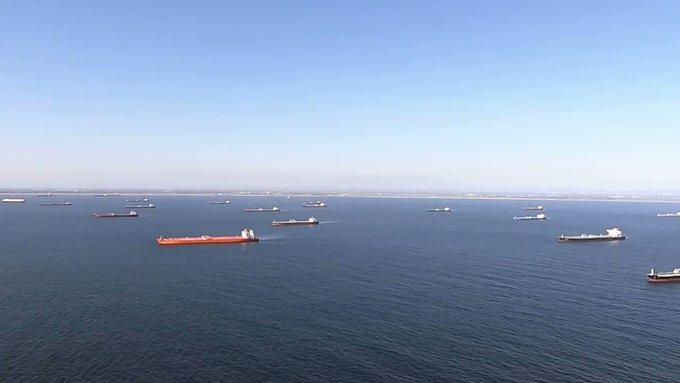Een
groot aantal mammoettankers ligt vooral voor de kust van Californië,
terwijl de lading niet kan worden gelost. Het gaat hier om een
hoeveelheid die gelijkstaat aan 20 miljoen vaten ruwe olie. Door het
Coronavirus ligt de industrie en het ‘kantoorleven’ ook in de VS voor een fiks deel op haar gat en is de
vraag naar olie op een niveau dat niet eerder werd gezien (uiteraard
in verhouding tot het verbruik in het verleden).
(Twitterbericht uit een Zero Hedge artikel*🙂
Javier Blas
✔
@JavierBlas
VIDEO: US Coast Guard says it’s keeping an eye on 27 oil tankers anchored off the coast of Southern California. Another great example of floating storage build-up as demand for oil and refined products plunge | #OOTT #Contango video via @USCGLosAngeles

Dit zet
overigens nog eens een heel groot vraagteken bij de claim dat de VS
zelf voorziend is wat betreft olieverbruik, blijkbaar is ook dat een
onderdeel van de tactiek die de grootste leugenaar op aarde, Trump
hanteert om zijn achterban te besodemieteren….
Om e.e.a. in verhouding te zien: het gaat in die mammoettankers
om een hoeveelheid olie die 20% vertegenwoordigt van het dagelijkse
wereldwijde verbruik aan olie (althans in ‘normale tijden’)…….
Het is
de vraag hoelang deze tankers voor anker moeten blijven liggen, waar
de meeste van deze tankers zich al vanaf half april bevinden, waar de
kans dat er iets misgaat groeit met de dag, als één van die tankers
bijvoorbeeld door zwaar weer zou vergaan, is de ramp voor het
zeeleven niet te overzien…..
Voor de kust van Singapore liggen zelfs honderden olietankers voor anker….*
Het volgende artikel komt van Bloomberg:
Oil
Tankers Surround California With Nowhere to Unload
ByRobert
Tuttle
21 april 2020 23:31
CEST Updated on 22 april 2020 23:06 CEST
-
Total
of 20 million barrels of oil floats off U.S. West Coast - Tankers float off coast as
fuel demand plummets amid virus

A tanker sits beyond
an oil rig in Huntington Beach, California, on April 20.
Photographer: Michael
Heiman/Getty Images North America
Oil tankers carrying enough crude
to satisfy 20% of the world’s daily consumption are gathered off
California’s coast with nowhere to go as fuel demand collapses.
Almost three dozen ships —
scattered in waters from Long Beach to the San Francisco Bay — are
mostly acting as floating storage for oil that’s going unused as
the coronavirus pandemic shutters businesses and takes drivers off
the road. Marathon
Petroleum Corp.’s (MPC) refinery in Martinez, California, has been
idled and others, including Chevron
Corp.’s El Segundo refinery, have curtailed crude processing as
the state orders residents to stay at home.

The more than 20 million barrels of
crude is the highest volume of crude to ever float off the West Coast
at one time, according to Paris-based Kpler
SAS, which tracks tanker traffic.
About three quarters of those
tankers are holding oil in storage, meaning they have been floating
steadily for seven days, also a record.
Storage has become increasingly
scarce as a growing supply glut collides with collapsing fuel demand.
As traditional tanks have filled, oil has been pushed onto tankers to
float off Singapore, the U.S. Gulf Coast and, now, the U.S. West
Coast.
The slowdown in oil deliveries into
California was already becoming evident last quarter, when 38.8
million barrels of crude was delivered into Long Beach, down from 42
million barrels a year earlier, according to Port of Long Beach data.
The Seaexpress, a tanker that
normally carries fuel, is currently
holding crude for Royal
Dutch Shell Plc. for at least a month in Puget Sound, Washington,
after data on the ships draft indicated it loaded up at the company’s
Anacortes refinery.
======================================
* Zie (een meer uitgebreid artikel van Zero Hedge): ‘“We Are Moving Into The End-Game”: 27 Tankers Anchored Off California, Hundreds Off Singapore As Oil Industry Shuts Down‘
Voor meer berichten over de oliewinning, olieramp, Shell, Chevron en/of het Coronavirus, klik op het betreffende label, direct onder dit bericht.
